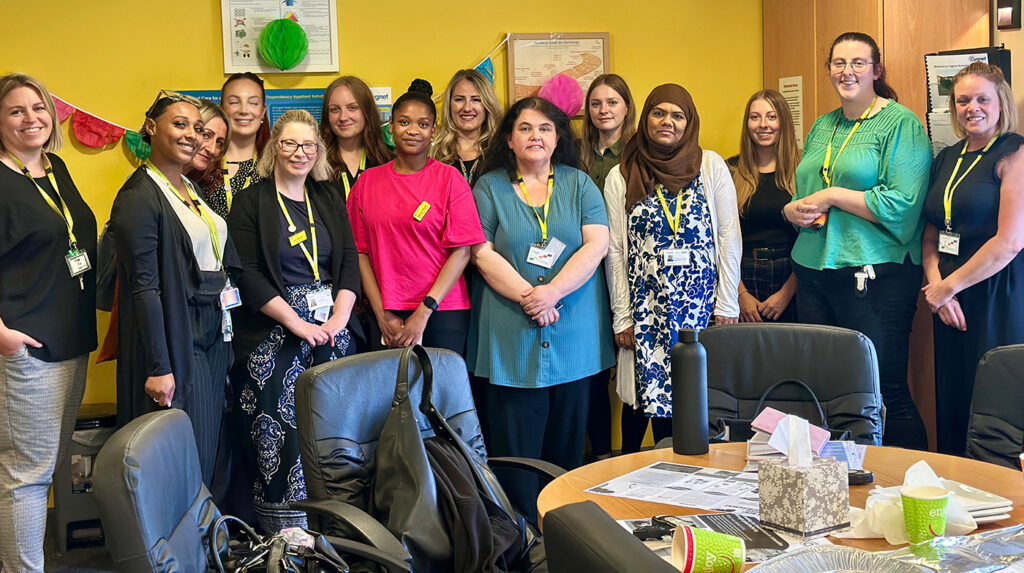Sheeba Devendran a Clinical Lead Occupational Therapist talks about why she became an OT and why she joined Cygnet
What made you want to be an OT?
I always wanted to work in a healthcare industry and aimed to undertake a career which involved genuine care for people.
In our family, my brother chose to study physiotherapy and we had countless nurses in our extended families as it was a well-known profession.
So, I intended to choose a new career pathway however, my options were limited and it happened by chance not by choice to pursue Occupational Therapy, having no clear idea of what the profession actually entails!
It was only during my time as a student occupational therapist, I was fascinated by the fact that Occupational therapy is a very unique profession that looks holistically at a person. I was so captivated during my clinical placements to see the benefits of occupational therapy in many fields and the difference it made in people’s lives, ranging from physical health, mental health, learning disabilities and across all age groups.
Looking back, I can say that it has been an incredible 22 years of career journey as an Occupational Therapist but I feel truly satisfied and accomplished to witness many, many life changing outcomes that the profession brings into people’s lives on a day today basis!
What made you want to work within Social Care specifically?
I started my journey as a Special School OT in India and predominantly worked with children with Autism and learning disabilities.
This particular client group grabbed my attention and I was so keen to learn more about how their brains and neural pathways are wired differently and how OT’s can support these children. That’s when I developed a passion for Sensory Integration approach that upskills OT’s to assess and assist people with sensory needs. In the year 2010, I moved to the UK in order to pursue my dream and here I am, working within Social Care for 13 years now and I am currently completing my Masters in Sensory Integration.
In particular, the opportunities of hands on practice with residents and the progress, however small and subtle it could be, that I see through the OT interventions, both direct and indirect that are implemented is what that keeps me absolutely motivated to work within Social Care.
What made you choose Cygnet – what was the appeal?
Financial benefits? Holistic approach to treatment? Development opportunities? Supportive environment? CQC ratings? Or something else?
First and foremost appeal is the training and the development opportunities that I get in Cygnet, not only professionally but also opportunities to study other courses like level 5, leadership and management course where I have acquired skills and knowledge on areas such as how to manage people, resources, projects and how to effectively lead, supervise people and resolve conflicts within teams.
Working for Cygnet provides me with a whole hosts of benefits, just to name a few, the support that I receive from the OT directorate, local operational teams and management teams at service levels are phenomenal. The networking opportunities that I receive from professional bodies both internally and externally are truly amazing. The working environment across all the services that I cover within Midlands are welcoming and supportive and my opinions and thoughts are highly valued. The autonomy and flexibility that I receive in Cygnet is what makes working for Cygnet a rewarding work experience for me both personally and professionally.
It’s a tough job that won’t suit everyone. What do you think are your main personality traits that make you suited to the role of OT within social care?
To me, any job comes with its own challenges and benefits and to some extent, a positive work experience, environment and working relationships shape our personality. There are many personality traits that might suit the role of OT within Social Care. Some of my personality traits are, I am a calm person – not easily pressurised by workload, I work hard – I take up high capacity work, I am a conscientious person – think carefully and plan meticulously, I am compassionate and empathetic – deeply care for people, initiative – resourceful, independent, honest and loyal – core ethics for any work!
What’s been the proudest moment of your career with Cygnet to date?
There has been numerous proudest moments in my career journey with Cygnet!
One of the memorable and proudest moment that I would always cherish on is when I received “Swan Award” at the Cygnet OT Conference last year. It was truly a honour and it meant a lot to me! Such a proud moment!
What excites you about the year (s) ahead in your role?
As a Clinical Lead OT for Social Care, I have many aspirations for the service line.
I would love to see many research and publication opportunities both internally and externally for OT’s within Social Care.
I am looking forwards to completing my Masters in June this year. I am excited to see QI projects that are up and running in full swing across all regions of Social Care. I can’t wait to see the OT book being published this year.
I hope to see new sensory integration assessments being brought into clinical practice this year. I am looking forwards to see many more OT’s within Cygnet taking on Sensory Integration Preceptorship program and excel in their specialism and thereby, provide high quality of life to our service users.
Last but not least, I strongly believe as OT’s we can make a lasting transformation in our residents lives in removing Mechanical restraints in Social care services through using other alternative and proactive OT strategies and through multidisciplinary working with wider staff teams.
I am thrilled to work collaboratively with residents, services, staff and with my Social Care OT colleagues towards this project in 2024!



